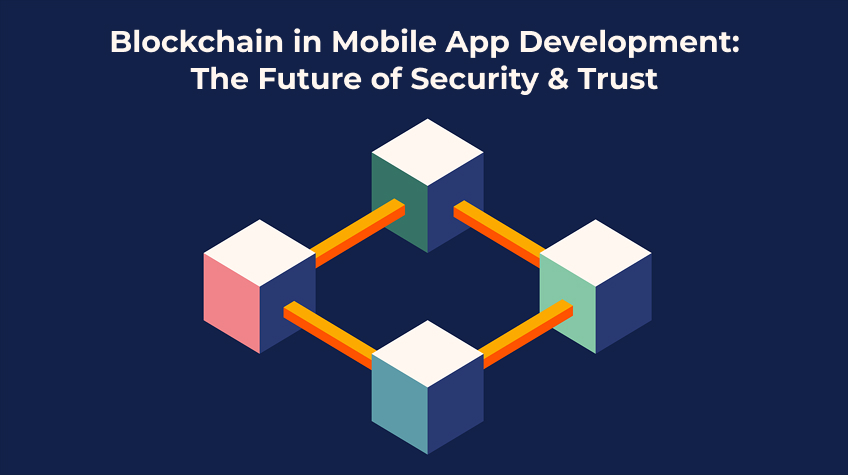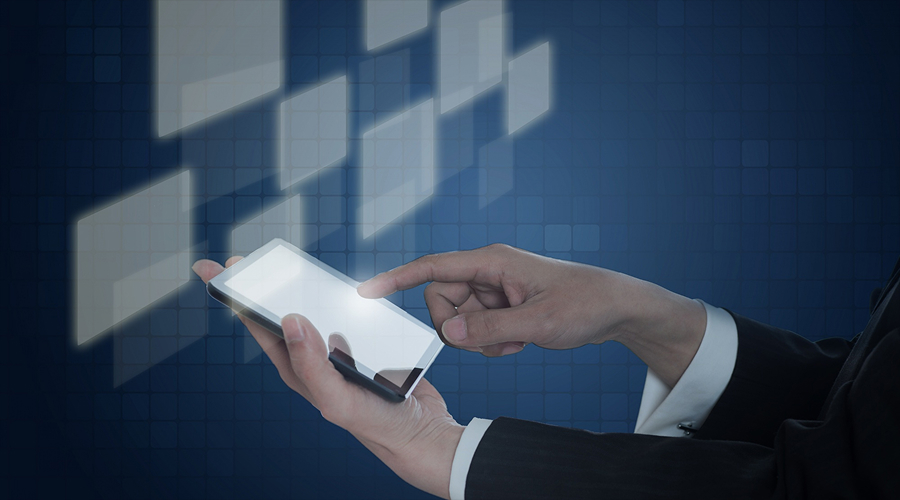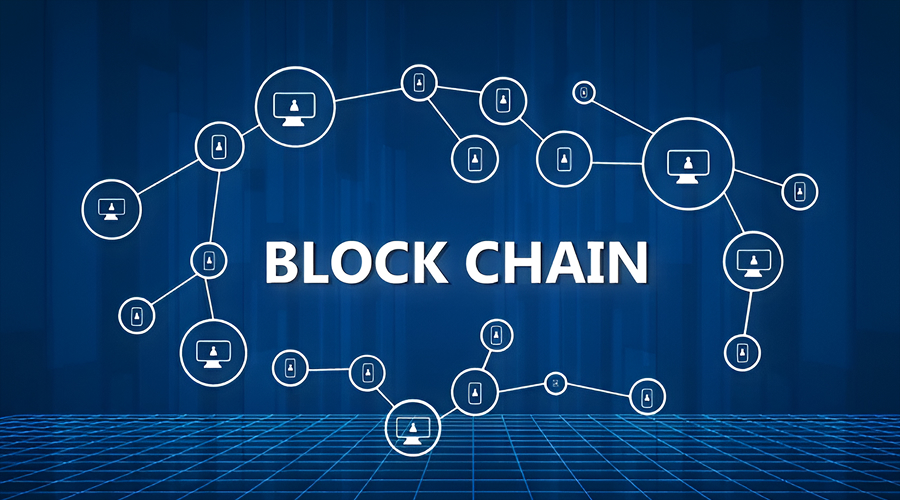
Blockchain technology is changing the way we develop safe and transparent mobile apps. This blog explains how blockchain enhances the protection of apps, grows user confidence, and influences the future of mobile application development with real-life scenarios and insights.
With the increasing use of technology, mobile apps have become very essential parts of our digital life, from shopping, banking, communication, to carrying out other daily activities. However, with an increased usage of mobile devices, there are more concerns with regard to data privacy, fraud, and security. Consumers are looking for reliable applications, and programmers are seeking more appropriate methods of securing sensitive data. This is where blockchain technology comes in. Blockchain is a well-known technology that powers cryptocurrency, and at present, it is being used to make mobile apps more reliable, transparent, and secure.
It assists in avoiding tampering with data, increasing the confidence among the users, and reducing the need to verify data by third parties. In this blog post, we will discuss how blockchain is reshaping mobile app development and how it is becoming the future of mobile application security and trust.
Why Is Blockchain Gaining Popularity in Mobile Apps?
Digital threats are increasing, and users are becoming more cautious. Users desire safe applications that value their privacy, whereas companies are seeking solutions that will help them earn the trust of the users and minimize fraud. Blockchain can address these two problems. Here’s the reason why blockchain gains traction in mobile development:
- Decentralized Storage: It means that the data of users is not kept at a single server, which minimizes the threat of hacking or losing data.
- Data Integrity: No tampering can be done on data once written. All the data in the blockchain is irreversible and checked by the network, hence very reliable.
- Transparency: Transactions can be viewed and validated by a user. This transparency creates trust, traceability, as well as accountability of every activity.
- Smart Contracts: These automatically enforced agreements save time and minimize expenses, and deliver work as specified in the coding.
These properties have made blockchain a perfect fit in apps related to payments, identity, healthcare, and supply chains.
Also Read: Benefits Of Using Blockchain In Mobile App Security
Key Benefits of Using Blockchain in Mobile Apps

Now, let us have a closer look at the key benefits of blockchain in mobile app development.
1. Enhanced Data Security
Hackers will find it very hard to manipulate or steal data with blockchain. Ledger is decentralized and is also encrypted, thus making it almost impossible to gain unauthorized access. Since all transactions are confirmed by several nodes, this is another source of security. It is particularly helpful for applications that store sensitive information, such as medical information or bank logs.
2. Improved Transparency and Trust
A blockchain-based application uses a public ledger to record all the transactions. This openness creates confidence among the users. Take a donation app, where the user is able to take a close look at the route of their financial contribution. This visibility extends the level of credibility and increases user affinity.
3. Better Data Control for Users
Blockchain lets you manage your data. Rather than storing information on a third-party server, information has stayed with the user. Only the apps are allowed to access it. This makes the users more powerful and complies with privacy legislation across the world, such as GDPR.
4. Reduced Costs and Faster Transactions
Blockchain does not need third parties such as payment handlers or banks. Consequently, transactions are made faster and cheaper. This is particularly advantageous in the case of mobile wallet applications, where one can transfer or receive money without undergoing delays or exorbitant charges.
5. Automation with Smart Contracts
Smart contracts are automated contracts written in a blockchain. They automatically perform operations upon the fulfillment of some set of conditions. In a mobile app, this has the ability to automate tasks, such as payments, verification, and supply chain updates- no human input is required, and no authorization of a third party is required.
Real-World Applications of Blockchain in Mobile Apps
Blockchain is already being applied in mobile apps in many industries. Here are a few examples:
1. Finance and Payments:
Blockchain-based apps like Coinbase and Binance allow secure trade of cryptocurrencies. Mobile wallets such as Trust Wallet and MetaMask allow people to manage, send, and receive digital currencies. Such apps are more secure and show enhanced transparency, which is missing in traditional financial apps.
2. Healthcare Apps:
Blockchain is being applied in applications to develop safe medical records and ensure the system can control the accessibility of a patient’s record. As an example, the MyClinic.com app uses blockchain to allow patients to organise their health records and share with doctors as securely as possible.
3. Supply Chain and Logistics:
Blockchain applications are used to trace goods in the production and delivery processes. This can be applied in business activities such as food, medicine, and fashion, where authenticity and reliability prove to be significant factors. A good example of this is IBM Food Trust, which enables users to trace the origins of foodstuffs with a mobile interface.
4. Identity Management:
Decentralized identity management is provided by blockchain apps such as Civic and uPort. Using these apps, you can verify your identity without giving personal information to every platform you interact with. This reduces identity theft and fraud.
5. Gaming and Digital Assets:
Games, such as Axie Infinity or The Sandbox, built on blockchain, bring the ability to generate and exchange digital assets on mobile applications. Being NFTs (non-fungible tokens), they are kept on the blockchain, with owners receiving actual ownership rights.
Challenges in Integrating Blockchain with Mobile Apps

- Complex Development Process: Blockchain is still a developing technology. Programmers have to acquire new technologies and applications. The process of integrating blockchain into a mobile application includes the understanding of smart contracts, a decentralized network, and encryption.
- Scalability Issues: Networks based on blockchain may experience problems with performance. The network may become overloaded, which will reduce transactions. Developers should select blockchain platforms that are scalable or apply Layer 2 solutions.
- Storage and Speed Limitations: Saving information in a blockchain is more costly and time-consuming than in standard databases. This may be an issue with mobile apps that require speedy operations. Most developers apply a mixed model, storing sensitive data on-chain and the rest off-chain.
- User Experience: Blockchain applications usually have complicated functionality, such as wallet configuration and the management of a private key. This is likely to confuse the non-technical users. Developers must make interfaces that are easy to use.
Best Blockchain Platforms for Mobile App Development
The key to success in blockchain mobile app development is the selection of the platform. The following are some of the blockchain platforms that are popular in mobile application development:
- Ethereum: Most suitable to use with decentralized apps (DApps) and smart contracts.
- Solana: Famous for its speed and low costs of transactions.
- Polygon (MATIC): An Ethereum Layer 2 solution that is more performant.
- Hyperledger Fabric: It is suitable for enterprise-level mobile apps.
- Tezos: Provides self-upgradeable smart contracts.
Every platform is strong in its own way. Depending on the requirements of the apps, developers should apply the best one, depending on the budget and the volume of users.
Future of Blockchain in Mobile Development

With the maturity of blockchain, we are going to witness more mobile applications using blockchain technology, not only in the finance department, but social media, travel, learning, and others. The emergence of new trends, such as Web 3, decentralized apps (DApps), and digital identity, will be instrumental. We may also expect:
- Art, music, and real estate apps, as well as gaming apps, will utilize NFTs more.
- There will be improved collaboration between blockchain, AI, and IoT to create smarter, safer apps.
- Decentralized finance (DeFi) will introduce additional mobile-friendly financial services.
- Blockchain will secure voting and records through government and legal apps.
Blockchain will be the norm in mobile application design, making mobile applications not just more intelligent but also more credible as well.
Conclusion
Blockchain is changing the field of mobile application development in a manner we never anticipated a few years ago. Regardless of what kind of app you are creating, finance, healthcare, or a gaming-related one, blockchain can make your app more reliable and effective. Blockchain will be the center of mobile app development as more users ask for privacy and control, so it is time to adopt it now.






